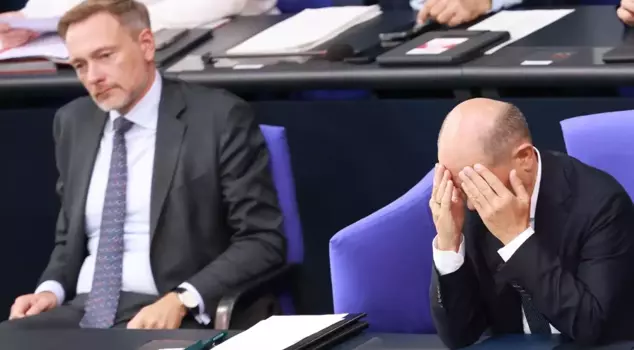
07.11.2024 09:50
The dismissal of Finance Minister Christian Lindner by Prime Minister Olaf Scholz and the announcement of a confidence vote have led to a deep crisis in the coalition government in Germany. The coalition's majority in parliament is at risk. The opposition stated, "The government is history."
The Free Democratic Party (FDP), the coalition partner in Germany, has decided to effectively withdraw from the coalition by pulling all its ministers out of the government.
FDP Federal Parliamentary Group Chairman Christian Dürr announced in Berlin that all FDP ministers have withdrawn from the government following the removal of the party leader, Finance Minister Christian Lindner.
Dürr stated that all FDP ministers would submit their resignations to President Frank-Walter Steinmeier.
Thus, the FDP has decided to leave the coalition partnership with the Social Democratic Party (SPD) and the Greens.
FDP LEADER LINDNER ACCUSED CHANCELLOR SCHOLZ
Removed Finance Minister Lindner made a statement in the Federal Parliament regarding the tensions among government partners. FDP Chairman Lindner said, "The Chancellor (Olaf Scholz) has requested me to suspend the debt brake in the constitution. I could not accept this as it would violate my oath of office. Therefore, the Chancellor canceled cooperation with me and the FDP at tonight's coalition meeting."
Lindner noted that he proposed early elections to facilitate the establishment of a new federal government and to guarantee Germany's mobility, stating, "The Chancellor firmly rejected this proposal at the coalition meeting."
MESSAGE OF CONTINUED STRUGGLE
Stating that they have been carrying the responsibility of government partnership for almost three years as the FDP, he said, "We have clear principles and beliefs. Our country is now facing a new directional decision. We need a new era of growth, prosperity, and innovation, and the Free Democrats are still ready to take responsibility for this country and will fight to do the same in another government next year."
Lindner criticized Chancellor Olaf Scholz for not having the power to enable Germany to make a new start.
Indicating that his party plans to alleviate the tax burden, implement a practical climate and energy policy, and provide more control over immigration, Lindner pointed out that these proposals were not even accepted as a basis for negotiation by the Social Democratic Party (SPD) and the Greens, stating: "Olaf Scholz has long failed to realize that our country needs a new economic revival. He has long underestimated the economic concerns of citizens. Even today, he questions the necessary decisions that would allow citizens to take pride in Germany again. The Chancellor's proposals are inadequate, unambitious, and do not contribute to overcoming our country's fundamental growth weaknesses. We cannot sustain our prosperity, social security, and ecological responsibility in this way."
CALLS FOR A VOTE OF CONFIDENCE AND EARLY ELECTIONS ON THE AGENDA
Robert Habeck, Deputy Prime Minister and Minister of Economy from the Green Party, stated that they know the government has not been making a good impression for some time, saying, "We have often debated, but I want to say that tonight is neither wrong nor right for us; it is almost tragic."
Habeck, noting Germany's role in the struggle for peace and freedom in Ukraine, said, "We want peace and freedom in Europe, and we have a special role here. The FDP was not ready to seize these opportunities."
Foreign Minister Annalena Baerbock also stated, "Today is not a good day for either Germany or Europe. However, we will continue to fulfill our responsibilities."
Markus Söder, the leader of the opposition Christian Social Union (CSU) and Bavarian State Prime Minister, called for an immediate vote of confidence in the Federal Parliament, not in mid-January.
Söder stated in a post on the social media platform X, "The government is history. No more time can be wasted. Germany needs new elections and a new government quickly. There should be no tactical delays."
PROCESS LEADING TO THE GOVERNMENT CRISIS
For some time, there have been issues among the coalition partners SPD, Greens, and FDP regarding economic matters in Germany.
The coalition government is facing difficulties regarding the 2025 budget, the second pension package, and a growth package called "Growth Initiative - New Economic Dynamics for Germany."
Particularly, the FDP's hawkish stance on finances has led to disagreements among partners regarding the budget to be prepared for 2025, creating an atmosphere of government crisis in the country.
ECONOMIC PLANS BECAME A CAUSE OF CONFLICT
Finance Minister Christian Lindner and Minister of Economy and Climate Protection Robert Habeck presented different and independent proposals for the revitalization of the economy. These proposals, which were not coordinated among the parties, indicated a deep division within the coalition.
Due to the disagreements, the leader of the coalition partner FDP, Finance Minister Christian Lindner, proposed early elections, which was rejected by Chancellor Scholz, who then removed Lindner from his position.
ELECTIONS MAY BE HELD WITHIN 60 DAYS
Due to the ongoing government crisis, the general elections expected to be held on September 28, 2025, are anticipated to be moved to an earlier date. Chancellor Scholz announced that he would request a vote of confidence on January 15, 2025, for this purpose. If Scholz fails to secure a vote of confidence, he will ask President Frank-Walter Steinmeier to call for elections, and following this process, elections could be held in Germany within 60 days. The earliest possible date for early elections in Germany could be March 9, 2025. The FDP had Finance, Justice, Transportation, and Education Ministers in the government.